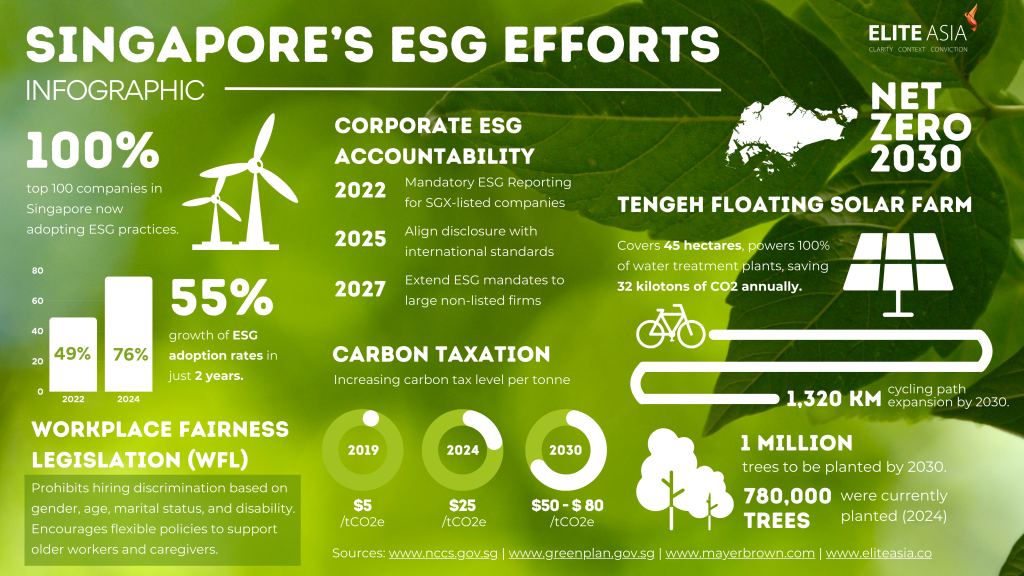
Get What Singapore Is Doing for ESG: Key Developments and the Path Ahead
Singapore has solidified its reputation as a global leader in ESG development, emerging as one of only seven countries worldwide where its top 100 companies fully adopt ESG reporting. This significant milestone underscores Singapore’s rapid transition toward sustainable business practices and its commitment to addressing climate change at all levels of society.
Over the past two years alone (2022-2024), the proportion of Singaporean companies integrating ESG practices has surged from 49% to 76%, reflecting how businesses, individuals, and policymakers are aligning to tackle climate change. We will explore ESG development in Singapore, including the innovative policies and groundbreaking initiatives under the Singapore Green Plan 2030, while shedding light on what ESG truly means for the nation’s future.
For a comparison with Malaysia’s sustainability progress and reporting frameworks, see A Deep Dive into ESG and Environmental Sustainability in Malaysia: Progress, Challenges, and Initiatives.
Why ESG Development Always Matters for Singapore
As a low-lying island nation in the tropics, Singapore faces distinct challenges from climate change. Heavy rainstorms and rising sea levels increase the risk of flooding, putting infrastructure, businesses, and communities at risk. Water management, too, is a pressing concern, as the country lacks natural freshwater resources and must contend with the strain of growing demand. These geographic realities have spurred Singapore to adopt forward-thinking policies integrating sustainability into every facet of life. Living sustainably isn’t just a goal; it’s become second nature for many Singaporeans.
For a broader view of how Singapore has rapidly advanced in ESG compared to other Asian economies, explore Get What Singapore Is Doing for ESG: Key Developments and the Path Ahead, which analyses policy trends and benchmarks for sustainability across the region.
Singapore’s Pioneering Sustainable Policies
Singapore’s commitment to sustainability is not just a lofty ideal—it is backed by decades of serious, forward-thinking government policies that have reshaped how its citizens live. Every measure counts on a small, densely populated island, and Singapore has consistently led by example to support a sustainable, high-standard way of life.
One of the country’s most remarkable policies is its decision to freeze vehicle population growth. Singapore is the only nation in the world to cap the number of vehicles on its roads. This bold move has significantly reduced traffic congestion, improved air quality, and lowered carbon emissions. This pragmatic approach to urban sustainability prioritises long-term environmental benefits over short-term convenience.
Equally groundbreaking is Singapore’s achievement in closing the water loop. Faced with water scarcity, the nation turned a vulnerability into a strength by pioneering advanced recycling and purification technologies. Singapore now reuses every drop of water multiple times, ensuring a reliable supply for its population and industries. This innovation highlights how foresight and resourcefulness can address even the most pressing sustainability challenges.
Singapore also demonstrates its seriousness about reducing emissions through its carbon taxation policy. Unlike many countries subsidising fossil fuels, Singapore has taken a firm stand by taxing carbon emissions. This strategy discourages businesses from polluting and incentivises investment in greener technologies. By prioritising environmental responsibility, Singapore sends a clear message: sustainability is non-negotiable.

What Singapore Has In Plan for ESG Development
For Singapore, ESG development isn’t just a corporate responsibility or a global trend. This is an urgent national priority and a matter of survival. Recognising the importance of balancing environmental, social, and governance factors, the country has built a sustainability framework reflecting pragmatism and ambition.
Unsure which reporting standard is right for your company? See Six Major ESG Frameworks You Need to Know: Which One is Right for You?, which compares the world’s top sustainability frameworks and how they fit with Singapore’s requirements.
Singapore Green Plan 2030: A Blueprint for Sustainability
Launched in 2021, the Singapore Green Plan 2030 is an ambitious national roadmap for sustainable development, aligning with the United Nations’ 2030 Sustainable Development Agenda and the Paris Agreement. The Green Plan aims to achieve net-zero emissions by 2050 and touches nearly every facet of Singaporean life.
One of the most remarkable achievements under the Green Plan is the Tengeh Reservoir floating solar farm, the first in Singapore. This innovative project generates enough renewable energy to power the country’s water treatment plants, showcasing how clean energy can be seamlessly integrated into essential services.
The Green Plan’s vision extends beyond infrastructure. It focuses on fostering sustainable habits, like encouraging cycling with a network of paths that will triple in length by 2030. Urban greenery projects, designed to transform neighbourhoods into “Cities in Nature,” aim to bring biodiversity closer to residents while improving air quality and mental well-being.
Corporate ESG Accountability
Beyond public policies, Singapore is also raising the bar for corporate sustainability. In 2022, the Singapore Exchange (SGX) made sustainability reporting mandatory for all listed companies. This groundbreaking move ensures businesses acknowledge their environmental and social impacts and take accountability through transparent reporting.
Under these guidelines, companies must disclose their ESG policies, climate-related risks, and board oversight on sustainability issues. By 2025, these disclosures will align with international standards, such as those outlined by the International Sustainability Standards Board (ISSB).
If your business is navigating new reporting obligations, our practical guide, How to Make the ESG Reporting Process Less Painful, offers strategies to simplify compliance and streamline your ESG disclosures.
The focus on corporate governance doesn’t stop at environmental factors. In recent years, Singapore has introduced diversity mandates for company boards, requiring firms to report on gender, skills, and other dimensions of diversity. These policies ensure inclusivity and enhance decision-making by bringing diverse perspectives to the table.
Expanding ESG to Non-Listed Companies
Recognising that private firms also have a role in sustainability, Singapore has expanded its ESG mandates to large non-listed companies. By 2027, these firms will be required to align their climate disclosures with ISSB standards, ensuring greater accountability across all sectors of the economy.
This shift highlights Singapore’s forward-thinking approach: ESG accountability should not be limited to publicly traded companies but must encompass the broader economic ecosystem.
Social Responsibility in ESG
While much attention is often given to environmental goals, Singapore is equally committed to addressing ESG social issues, particularly in the workplace. The recent Workplace Fairness Legislation (WFL), introduced in 2024, marks a significant step toward eradicating workplace discrimination.
The WFL explicitly prohibits hiring, promotions, and remuneration biases based on age, gender, marital status, and disability. By emphasising merit-based decisions, the legislation promotes inclusivity and fairness across industries.
The WFL encourages employers to adopt flexible policies and reasonable accommodations to support vulnerable groups such as older workers and individuals with caregiving responsibilities. These measures create equitable workplaces and strengthen Singapore’s position as a global leader in social sustainability.
For actionable ideas to foster workplace inclusivity and social impact, read The ‘S’ in ESG Matters: A Guide to Measure and Track Social Issues in ESG.
What Are ESG Developments in Singapore?
So, what are ESG developments, and how do they reflect Singapore’s approach? ESG developments refer to the innovations, strategies, and frameworks that drive sustainability. In Singapore, these include:
- Pioneering policies like carbon taxation and mandatory ESG reporting.
- Transformative projects under the Singapore Green Plan 2030 include green buildings and renewable energy systems.
- Social equity initiatives, including the WFL, that prioritise inclusivity and fairness.
Together, these developments highlight how Singapore redefines what it means to create a sustainable, equitable society.
For SMEs eyeing government support for their sustainability journey, Sustainability Reporting Grants for SMEs: How to Get Funded for ESG Reporting in Singapore details the available grants and how your business can access funding for ESG initiatives.
Singapore’s Path Forward in ESG
Singapore’s ESG journey is a story of resilience, innovation, and collective action. From the bold ambitions of the Green Plan 2030 to mandatory corporate ESG accountability, the nation is proving that sustainability is not just a goal but a shared responsibility.
Singapore’s framework offers valuable lessons for businesses, investors, and individuals on how to balance progress with purpose. By championing ESG development, the country is safeguarding its future and setting a benchmark for others to follow.
To ensure your ESG reports are not only compliant but also engaging to stakeholders, check How to Design an ESG Report That Actually Gets Read.
As Singapore continues to lead the way in ESG development, businesses need expert guidance to navigate the complexities of sustainability. Elite Asia offers ESG services tailored to help Singaporean enterprises achieve sustainability goals, whether you want to comply with regulations, showcase your achievements, or read.
For any enquiries or quotations pertaining to ESG Solutions, get in touch with our ESG solutions department below:










